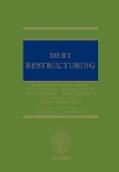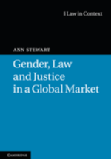Books Published by Staff in 2011
Celine Tan 'Governance through Development: Poverty Reduction Strategies, International Law and the Disciplining of Third World States'

Published February 7th 2011 by Routledge-Cavendish – 268 pages
Governance through Development locates the Poverty Reduction Strategy Paper (PRSP) framework within the broader context of international law and global governance, exploring its impact on third world state engagement with the global political economy and the international regulatory norms and institutions which support it. The PRSP framework has replaced the controversial structural adjustment programmes, as the primary mechanism through which official development financing is channelled to low-income developing countries. It has changed the regulatory landscape of international development financing, signalling a wider paradigmatic shift in the cartography of aid and, consequently, in the nature of north-south relations. Governance through Development documents and analyses this change within the legacy of postcolonial economic relations, revealing the wider legal, economic and geo-political significance of the PRSP framework. Celine Tan argues that the PRSP framework establishes a new regulatory regime that builds upon the disciplinary project of structural adjustment by embedding neoliberal economic conditionalities within a regime of domestic governance and public policy reform.
Debt Restructuring (Oxford University Press 2011)

Rodrigo Olivares-Caminal, John Douglas, Randall Guynn, Alan Kornberg, Sarah Paterson, Dalvinder Singh and Hilary Stonefrost, Edited by Nick Segal and Look Chan Ho
520 pages | 246x171mm
978-0-19-957969-3 | Hardback | 14 April 2011
Price: £155.00
Ann Stewart 'Gender, Law and Justice in a Global Market' (Cambridge 2011)
 Theories of gender justice in the twenty-first century must engage with global economic and social processes. Using concepts from economic analysis associated with global commodity chains and feminist ethics of care, Ann Stewart considers the way in which 'gender contracts' relating to work and care contribute to gender inequalities worldwide. She explores how economies in the global north stimulate desires and create deficits in care and belonging which are met through transnational movements and traces the way in which transnational economic processes, discourses of rights and care create relationships between global south and north. African women produce fruit and flowers for European consumption; body workers migrate to meet deficits in 'affect' through provision of care and sex; British-Asian families seek belonging through transnational marriages.
Theories of gender justice in the twenty-first century must engage with global economic and social processes. Using concepts from economic analysis associated with global commodity chains and feminist ethics of care, Ann Stewart considers the way in which 'gender contracts' relating to work and care contribute to gender inequalities worldwide. She explores how economies in the global north stimulate desires and create deficits in care and belonging which are met through transnational movements and traces the way in which transnational economic processes, discourses of rights and care create relationships between global south and north. African women produce fruit and flowers for European consumption; body workers migrate to meet deficits in 'affect' through provision of care and sex; British-Asian families seek belonging through transnational marriages.
Rebecca Probert 'The Rights and Wrongs of Royal Marriage'

The laws which govern the marriages of the British royal family have led to heartbreak, farce and confusion, and are unfit for the twenty-first century. In an era that values human rights and free choice, there is little certainty over questions as fundamental as the effect of marrying a Roman Catholic, or of marrying without the Queen's consent. Question marks still hang over the legal basis for royal civil marriage. Obscure acts of Parliament have threatened to render members of the royal family illegitimate and prevented others from following their hearts. Drawing on a wide range of sources including once-secret files in the UK's National Archives, The Rights & Wrongs of Royal Marriage recounts episodes from the eighteenth century right down to the present day that would not look out of place in Yes, Minister or The Mikado. Professor Rebecca Probert, the leading authority on the marriage law of England and Wales, is as characteristically clear when explaining the complexities of royal marriage law as she is in her other groundbreaking studies. Her prose is concise and elegant, and full of historical anecdotes that will have royalists and republicans alike laughing aloud and wide-eyed with astonishment.
Victor Tadros 'The Ends of Harm: The Moral Foundations of Criminal Law' (OUP, 2011)

Every modern democratic state imprisons thousands of offenders every year, depriving them of their liberty, causing them a great deal of psychological and sometimes physical harm. Relationships are destroyed, jobs are lost, the risk of the offender being harmed by other offenders is increased and all at great expense to the state. How can this brutal and costly enterprise be justified? Traditionally, philosophers answering this question have argued either that the punishment of wrongdoers is a good in itself (retributivism), or that it is a regrettable means to a valuable end, such as the deterrence of future wrongdoing, and thus justifiable on consequentialist grounds. This book offers a critical examination of those theories and advances a new argument for punishment's justification, calling it the 'duty view'. On this view, the permission to punish offenders is grounded in the duties that they incur in virtue of their wrongdoing. The most important duties that ground the justification of punishment are the duty to recognize that the offender has done wrong and the duty to protect others against wrongdoing. In the light of these duties the state has a permission to punish offenders to ensure that they recognize that what they have done is wrong, but also to protect others from crime. In contrast to other justifications of punishment grounded in deterrence, the duty view is developed in the light of a non-consequentialist moral theory: a theory which endorses constraints on the pursuit of the good. It is shown that it is normally wrong to harm a person as a means to pursue a greater good. However, there are exceptions to this principle in cases where the person harmed has an enforceable duty to pursue the good. The implications of this idea are explored both in the context of self-defence, and then in the context of punishment. Through the systematic exploration of the relationship between self-defence and punishment, the book makes significant progress in defending a plausible set of non-consequentialist moral principles that justify the punishment of wrongdoers, and marks a significant contribution to the philosophical literature on punishment.
John Snape 'The Political Economy of Corporation Tax: Theory, Values and Law Reform' (Hart 2011)

Excellent technical writing on corporation tax abounds but it tends to be inaccessible to public lawyers, political theorists and political economists. Although recent years have seen not only an explosion in public law scholarship, but also a reawakening of interest in interpretative political theory and political economy, the potential of these perspectives to illuminate the corporation tax debate has remained unexplored. In this important work, John Snape seeks to reconcile these disparate strands of scholarship and to contribute to a new way of understanding and conceptualising the reform of the law relating to corporate taxation. Drawing on important developments in public law scholarship, the study combines elements of political theory and political economy. It advances a new interpretation of corporation tax law as an instrument of rule, through the maximisation of a nation’s economic potential. Snape shows how corporate taxation belongs at the centre of any discussion of economic globalisation, not only because of the potential of national tax systems to influence inward investment decisions but also because of the potential of those decisions to shape the public interest that those tax systems might embody. Following public law and politics models, the book looks afresh at the impact of Britain’s political institutions, of the processes of its representative government and of the theory that moulds and orders the values that the corporation tax code contains. This is a timely exploration of cutting-edge issues of public policy.
